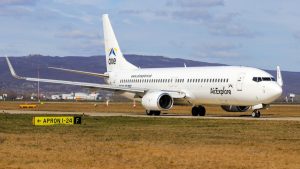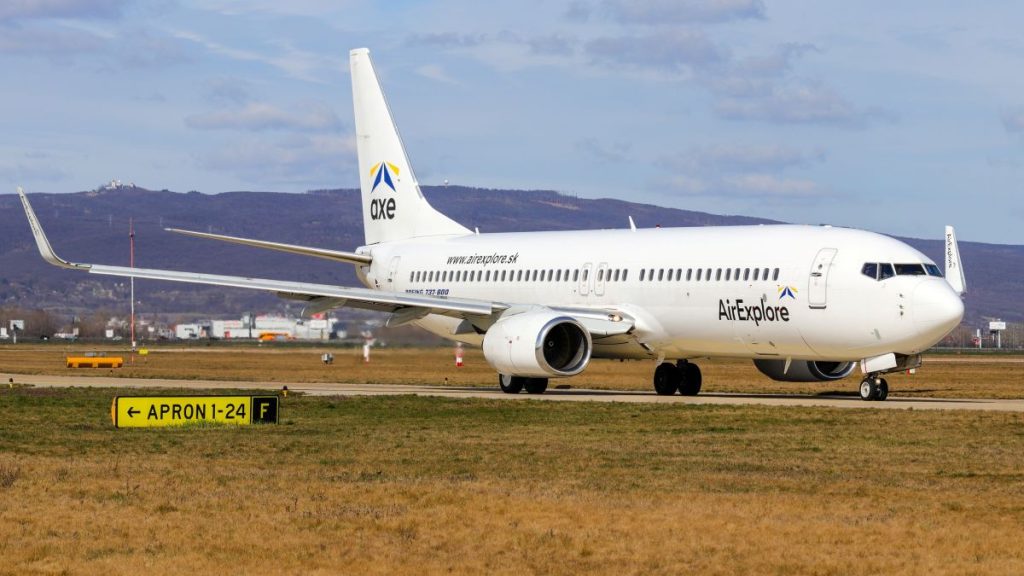 As the third quarter of the year, where most European airlines typically make the majority of their profits, is nearing its end, one thing is clear. Aircraft delivery delays that have plagued the industry throughout the last few years are here to stay. This challenge is fundamentally reshaping how European carriers approach capacity planning and network expansion, with the ACMI (Aircraft, Crew, Maintenance, and Insurance) model being the most feasible option, points out Martin Stulajter, CEO of AirExplore, Slovakia’s largest airline.
As the third quarter of the year, where most European airlines typically make the majority of their profits, is nearing its end, one thing is clear. Aircraft delivery delays that have plagued the industry throughout the last few years are here to stay. This challenge is fundamentally reshaping how European carriers approach capacity planning and network expansion, with the ACMI (Aircraft, Crew, Maintenance, and Insurance) model being the most feasible option, points out Martin Stulajter, CEO of AirExplore, Slovakia’s largest airline.
From engines to seats – everything is late
July 2025 saw the combined backlog of aircraft from major manufacturers, including Boeing and Airbus, exceed 16,000 aircraft for the very first time. This unprecedented supply-demand imbalance has been influenced by multiple reasons, supply chain disruptions being the main one.
“Around 60 Airbus A320neo aircraft are currently completed but parked without engines due to Pratt & Whitney GTF shortages, while Boeing continues to grapple with production constraints that have limited monthly output and pushed delivery timelines well into 2026 and beyond,” notes Martin Stulajter, CEO of AirExplore, which is part of Avia Solutions Group, the world’s largest ACMI provider.
The scale of this crisis became apparent when 2024 aircraft deliveries totaled just 1,254 units – 30% less than anticipated by industry analysts. For 2025, the predicted total of 1,802 aircraft is not guaranteed and remains considerably below the 2,293 aircraft the market expected to see delivered.
These delays extend far beyond engine shortages. The aviation industry is confronting what experts describe as a perfect storm of supply chain disruptions. Seat and cabin component production delays are adding months to delivery schedules, with the airline seat industry struggling to scale to true industrial production. Premium business-class seats, which can cost airlines up to UDS 100,000 each, have become another bottleneck in the certification and installation process.
Aircraft delivery delays to remain the hallmark of the decade
The implications of aircraft and aircraft parts delivery delays extend far beyond operational headaches. Industry analysts are now predicting that airfares will remain elevated at least until 2030, as the reduced aircraft availability creates what experts describe as “capacity discipline”. While airlines publicly express frustration about delivery delays, the constrained supply has also reduced competition and created conditions to justify higher fares.
“The capacity shortage has created a new equilibrium in the market,” explains Stulajter. “Airlines can no longer rely on traditional capacity cycles or expect relief through summer aircraft returns. This is forcing a strategic recalibration across the industry, where flexible capacity solutions through ACMI partnerships have become essential for maintaining competitive positioning and network integrity.”
In Europe, major carriers including Ryanair and Wizz Air have acknowledged delivery shortfalls, with Wizz Air confirming that its sizable order for 280 Airbus aircraft, originally scheduled for delivery between now and 2030, will now be pushed back a further year, initially through 2031. The budget carrier has also scaled back its growth expectations from 20% to just 10-12% due to these changing circumstances.
“This structural shift in aircraft availability is driving a fundamental change in how airlines view ACMI leasing. What was traditionally considered a summer-only solution for managing peak seasonal demand has rapidly evolved into a year-round strategic necessity,” Stulajter shares.
The advantages of the ACMI model
The ACMI model helps carriers in achieving a cost-effective capacity increase by reducing fixed costs and taking advantage of more favorable IFRS 16 conditions in comparison to traditional leasing. Industry trends shows that the model is becoming more popular across the world, with airlines approaching it differently depending on their seasonal patterns, route networks and a number of other factors.
“Being in constant communication with other ACMI airlines within the Group, we can safely say that there is no one-size-fits-all approach when it comes to solving carriers’ capacity issues. Each airline’s route network, seasonal patterns, and operational challenges require tailored solutions. However, a rule of thumb is that a balanced split of up to 85/15 between owned and wet leased aircraft is optimal for most European airlines,” Stulajter explains.
For ACMI operators based in Central and Eastern Europe, recent shifts in the market present ample opportunities for growth. The region’s strategic location and cost-competitiveness make it a suitable home base for developing ACMI capacity that the entire continent’s airlines can benefit from.
AirExplore is a fine example of that. Operating from Slovakia, AirExplore has grown from a single Boeing 737-400 in 2010 to a fleet of 16 Boeing 737-800 aircraft today. The growth was spurred in 2024, when the company joined Avia Solutions Group, which operates a total of 209 passenger and freighter aircraft across multiple geographies. Being a part of a larger group provides an airline like AirExplore with additional resources and the ability to shift aircraft to counter-seasonal markets, if such a need arises. The airline’s Bratislava base provides operational advantages in serving routes across Europe while maintaining cost efficiencies that benefit partner airlines.
“We can provide flexible capacity solutions that help carriers maintain their network commitments even when their own aircraft deliveries are delayed. After all, it isn’t just about filling gaps during summer peaks anymore. Airlines that are dealing with delivery uncertainties lasting multiple years require and expect structural support,” says AirExplore CEO.
AirExplore’s approach reflects this shift. The company’s 15-year track record includes partnerships with major carriers including Ryanair, where operational excellence and quick turnaround capabilities have been essential. This experience has positioned the airline to support partners facing more complex and sustained capacity challenges.
“The summer season may be over, but for European airlines and their ACMI partners, the real work of adapting to a new operational reality is just beginning. In this environment, flexibility, reliability, and strategic partnership will determine which carriers thrive despite the ongoing delivery delays that show no signs of seasonal reprieve,” Stulajter concludes.







